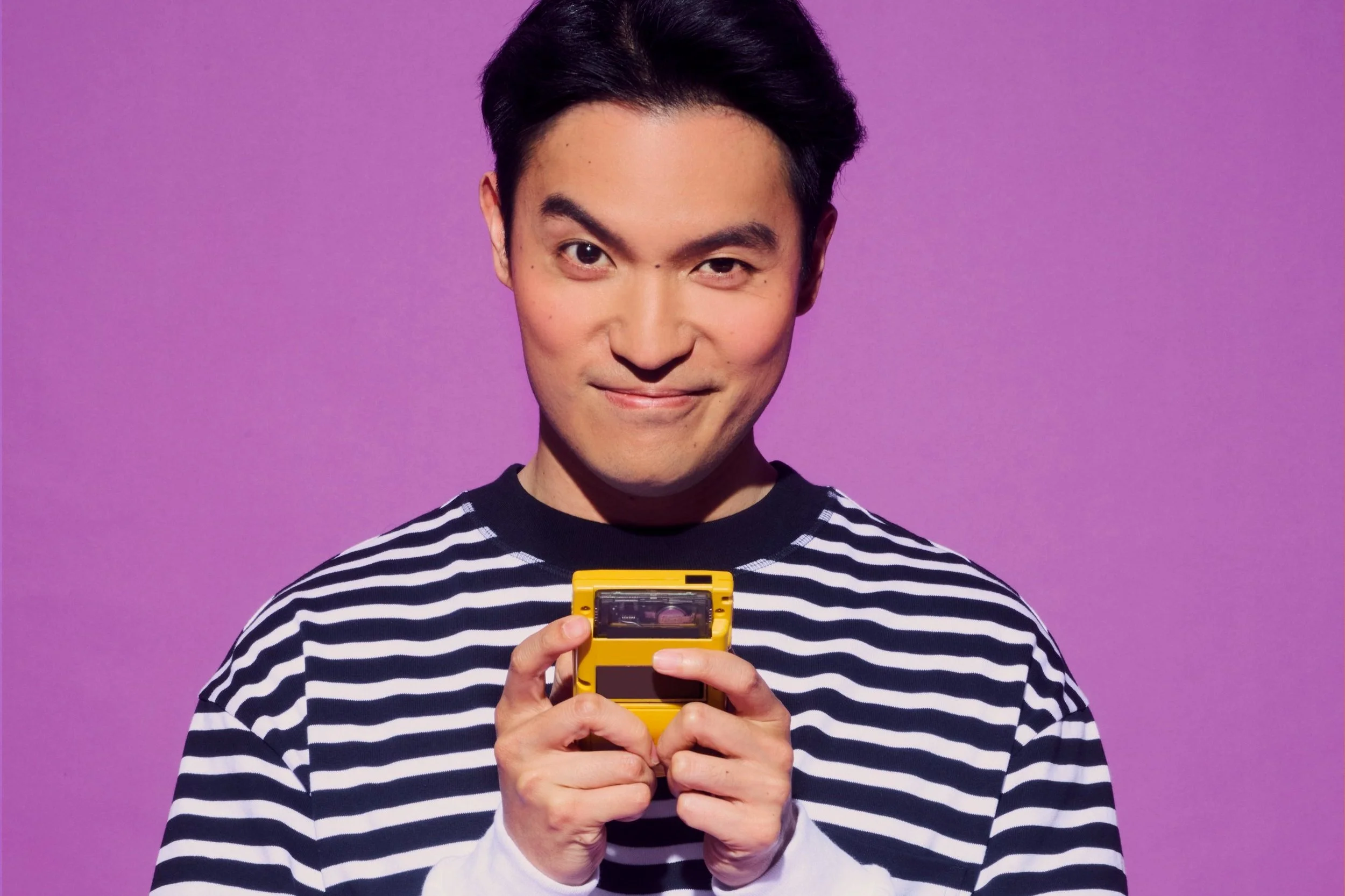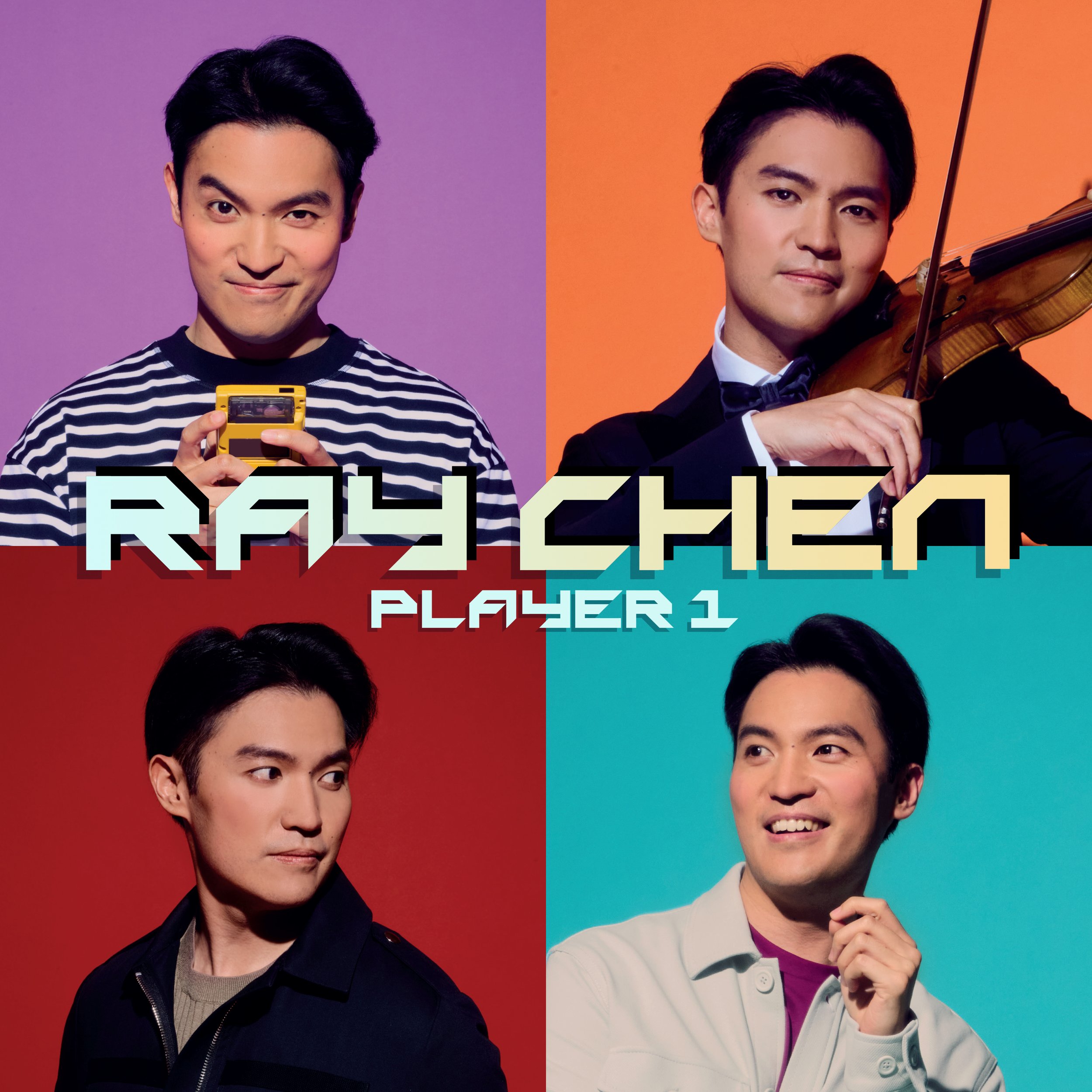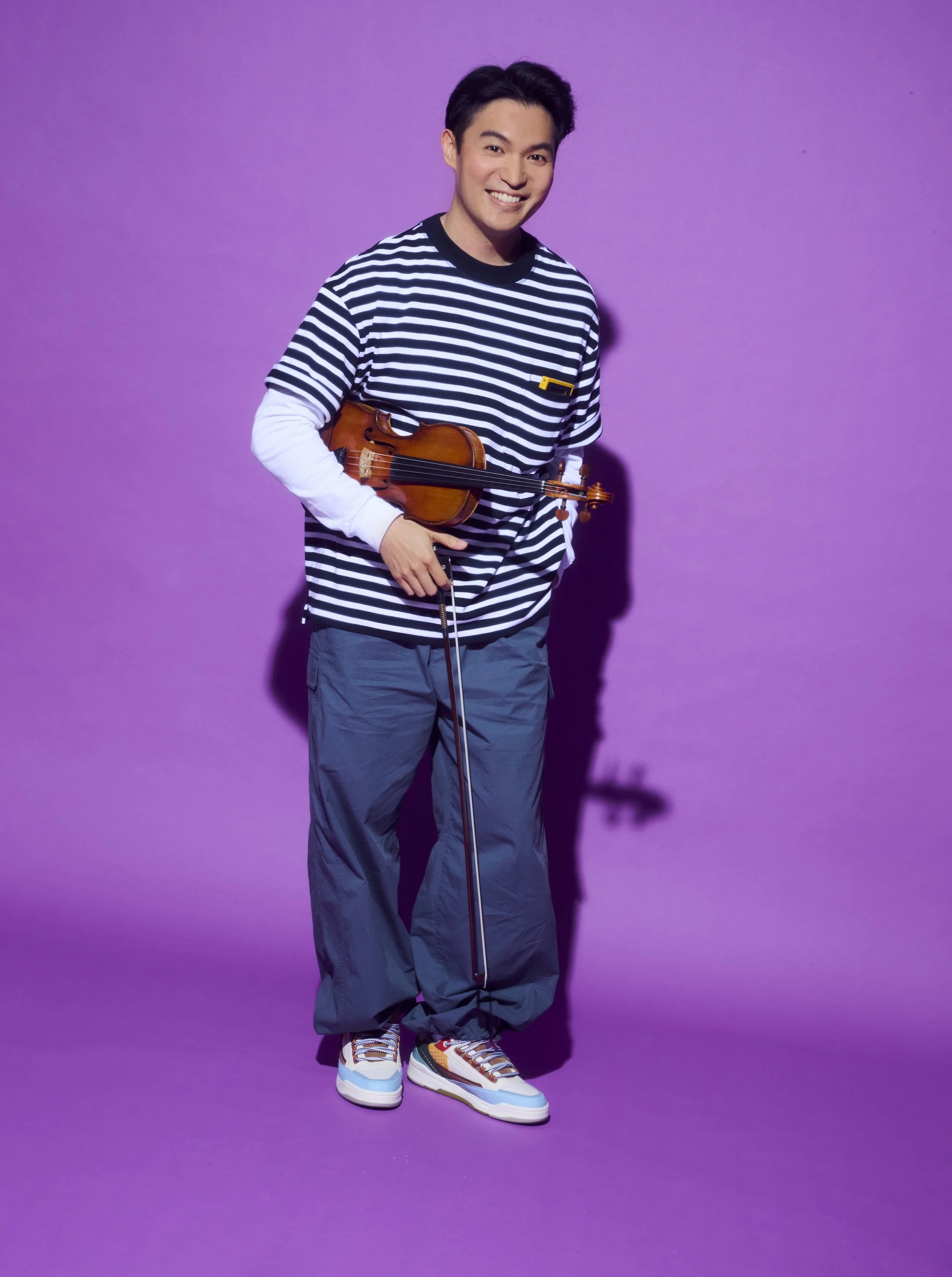The NEW ALBUM - PLAYER 1
Choose your character. Three words that will be familiar to anyone who’s ever played a computer game. On Player 1, award-winning violinist Ray Chen reveals to us the links that bond classical music and gaming. Both involve interaction and multiplayer experiences. Both have their parameters set by a “games-master” or composer: one dictates the rules via code, the other via black squiggles on paper. Both bring delight and joy. And both conjure rich worlds in which players can roam, discover and grow. On the album cover, Ray shows us his different guises: entrepreneur, musician, social media infl uencer and games enthusiast. He’s Player 1. You, the listener, are Player 2. Are you ready?
-
The album comprises a thrilling array of themes from games but also television, anime and film. Recorded in London with the Royal Philharmonic Orchestra and conductor Cristian Mǎcelaru, tracks include the main theme from the Nintendo game The Legend of Zelda: Tears of the Kingdom, “Pallet Town” from Pokémon Red and “I Remember My Name” from Squid Game. These compositions gravitate around the sonic centrepiece of Erich Wolfgang Korngold’s sublime Violin Concerto, composed in 1945 by the godfather of the sweeping Hollywood soundtrack. Like Ray, Erich was a child prodigy. Like Ray, he was drawn to the dramatic and the cinematic. And like Ray, he understood the thrill of storytelling. Nintendo consoles, TV dramas, films, anime, soundtracks and a near century-old work by Korngold may at first seem like disparate cultural phenomena. But they have one thing in common. They weave fantasies. Player 1 is a contemporary journey into these fantastical realms.
Nostalgia looms in surprising and uplifting ways. Ray performs using the 1714 “Dolphin” Stradivarius, the violin that once belonged to Jascha Heifetz, who premiered the Korngold Concerto in 1947. Ray is the web that binds everything together. “Player 1 aims to create a meaningful connection between the past and the present,” he says.
The past to which he refers also includes the recent past. His music acts as an enchanted key that unlocks doors in our memory. Ray knows that many Generation X and Millennial fans grew up playing video games or watching older siblings play (Ray still plays The Legend of Zelda on his Nintendo Switch). Many of these listeners now have children who are gamers. The album, then, is “for all the kids who grew up”, he says. Player 1 proves beyond doubt that melody and memory can be two sides of the same precious coin.
Through this album, Ray is trying to change how classical music is viewed. He believes the genre is too often seen as formal, complex and traditional when it should be seen as accessible, inspiring and joyful. Just like computer games, he believes that classical music should integrate seamlessly into our daily lives. This is his mission.
If anyone can achieve it, Ray can. Born in Taiwan and raised in Australia, he played as a soloist with the Queensland Philharmonic Orchestra aged eight. He was still a teenager when he won the Yehudi Menuhin competition in Cardiff in 2008. The following year he won the Queen Elisabeth Competition in Brussels. From here, he didn’t look back. His career achievements are legion: from playing live in front of an audience of 800,000 in Paris’s Champ de Mars to founding the Made in Berlin string quartet. He has duetted with musicians as diverse as Sting and Jay Chou, known as the “King of Mandopop”. Ray has a global social media reach of over 2.3 million people via platforms including TikTok, Instagram and Discord. This figure has almost doubled in the last year alone, while Tonic – his app for music practice, motivation and feedback – now has over 150,000 users. Nine albums in, Ray is without question redefining what it means to be a classical musician in the 21st century.
But at its heart, Player 1 is about the music. Each theme for this album has been specially arranged for Ray with stunning results. “Pallet Town”, from Pokémon Red, used to only exist as a flat-toned 8-bit sound on a Game Boy console, catchy but tinny. Here, that same tune becomes lush, symphonic and full, making a mockery of any perceived boundaries between classical music culture and anime and gaming culture. Ray commissioned the track Serenade from Los Angeles-based Indonesian composer Eunike Tanzil. Its delicate refrain is as light as summer clouds yet it builds to evoke the epics of the silver screen. Korngold’s classical masterwork, meanwhile, is given new life with a definitive interpretation. Its soaring phrasing, played here with stunning virtuosity, is unforgettable.
Ray is proof that the violin – and the possibilities it holds – is ever evolving, just like technology itself. Player 1 demonstrates that classical music can be a conduit for new forms of expression. Games connect and bond people. And so, in an emphatic way, will this album. So get ready to play.
JAMES HALL
“TO DIE FOR. He had the kind of liquid tone that carries with it EMOTIONAL DEPTH OF GREAT INTIMACY“
THE HUFFINGTON POST
MUSIC EDUCATION
Motivational Series Part 1:
Dealing with Insecurity
Play with ray
live your dream of performing
on the most iconic stages
“Sibelius dreamed of a career as a violin virtuoso. Ray Chen is fulfilling this dream with a brilliant debut in the Golden Hall [of Musikverein]. Rock-solid technique and lush sound.” KURIER
BIOGRAPHY
Violinist and online personality, Ray Chen redefines what it means to be a classical musician in the 21st century. With a global reach that enhances and inspires a new classical audience, Ray Chen's remarkable musicianship transmits to millions around the world, reflected through his engagements both online and with the foremost orchestras and concert halls around the world. Beyond the performing arts, his work has also contributed to philanthropy, popular culture and educational technology.
Initially coming to attention via the Yehudi Menuhin (2008) and Queen Elizabeth (2009) Competitions, of which he was First Prize winner, he has built a profile in Europe, Asia, and the USA as well as his native Australia both live and on disc. Signed in 2017 to Decca Classics, the summer of 2017 has seen the recording of the first album of this partnership with the London Philharmonic as a succession to his previous three critically acclaimed albums on SONY, the first of which (“Virtuoso”) received an ECHO Klassik Award. Profiled as “one to watch” by the Strad and Gramophone magazines, his profile has grown to encompass his featuring in the Forbes list of 30 most influential Asians under 30, appearing in major online TV series “Mozart in the Jungle”, a multi-year partnership with Giorgio Armani (who designed the cover of his Mozart album with Christoph Eschenbach) and performing at major media events such as France’s Bastille Day (live to 800,000 people), the Nobel Prize Concert in Stockholm (telecast across Europe), and the BBC Proms.
“It’s hard to say something new with these celebrated works; however, Ray Chen performs them with the kind of authority that puts him in the same category as Maxim Vengerov.”
He has appeared with the London Philharmonic Orchestra, National Symphony Orchestra, Leipzig Gewandhausorchester, Munich Philharmonic, Filarmonica della Scala, Orchestra Nazionale della Santa Cecilia, Los Angeles Philharmonic, SWR Symphony, New York Philharmonic, San Francisco Symphony, Pittsburgh Symphony, Berlin Radio Symphony, and Bavarian Radio Chamber Orchestra. He works with conductors such as Riccardo Chailly, Vladimir Jurowski, Sakari Oramo, Manfred Honeck, Daniele Gatti, Kirill Petrenko, Krystof Urbanski, and Juraj Valcuha.
More recently, Ray Chen co-founded Tonic, an independent startup that aims to motivate musicians and learners around the world to practice their craft together. Although new, the innovative app has cultivated a highly engaged and supportive community and is available to download on iOS and Android today. Ray Chen’s presence on social media makes him a pioneer in an artist’s interaction with their audience, utilising the new opportunities of modern technology. His appearances and interactions with music and musicians are instantly disseminated to a new public in a contemporary and relatable way. He is an ambassador for SONY Electronics, a music consultant for Riot Games - the leading esports company best known for League of Legends, and has been featured in Vogue magazine. He released his own design of a violin case for the industry manufacturer GEWA and proudly plays Thomastik Infeld strings. His commitment to music education is paramount, and inspires the younger generation of music students with his series of self-produced videos combining comedy, education and music. Through his online promotions his appearances regularly sell out and draw an entirely new demographic to the concert hall.
Born in Taiwan and raised in Australia, Ray was accepted to the Curtis Institute of Music at age 15, where he studied with Aaron Rosand and was supported by Young Concert Artists. His previous instrument was the 1714 “Dolphin” Stradivarius, once owned by Jascha Heifetz, on generous loan from the Nippon Music Foundation. In 2025, Ray began a new chapter in his musical journey, exploring the world of rare violins and play-testing 24 Stradivari and Guarneri del Gesùs (and counting). Among them, a 1727 Stradivarius has become one of his favorites so far and is the instrument he currently performs on.
“The joy that’s inherent in music is meant to be shared.” RAY CHEN
Tonic MUSIC
In 2020, Ray began working on a project close to his heart. Being involved in and passionate about the development of young musicians, he observed that practice—despite being an essential element of study—was the biggest obstacle in the journey to success. Through his own experience, he found that the best motivators for regular music practice were supportive friends and peers who could relate to and encourage the musician. Ray founded Tonic to address that need, for the benefit of the music community.
Tonic is an innovative music practice platform designed to make classical music accessible, connected and fun for a global community of musicians and learners. Focused on improving the detached experience of practice, Tonic motivates people on their musical journey and gives access to allow everyone to enjoy the best parts of being a musician: to play & share.
In the Tonic app, users can open live Studios for their practice sessions and play for a supportive audience of peers. Users set their own schedule, keep track of practice time to stay on track for their goals and earn Badges and other rewards for their efforts. Tonic also offers community events such as Challenges and Leagues which are supported by partnerships with established brands in the music industry. Social features such as Groups and Studio invitations help users build and maintain deeper friendships through the app.
Tonic began in 2020 as a pandemic passion project, but has since had over 1 million live Studios created. Users in over 130 countries love the platform and contribute to its community with creativity and openness. Built by music lovers for music lovers, it is a home and a haven for those who want to see the joy of music come alive through community.
"The tone he gets is almost human in its slight graininess and glow."
THE WASHINGTON POST
CONCERTS
“Colors dance, moods swing, and Chen’s artistry blazes.”
THE TIMES
MEDIA
Please click on the videos & photos to enlarge them.
For more photos in high resolution, please click here.




"[Ray Chen] als Tschaikowsky-Volltreffer ... der australisch-taiwanesische Stargeiger, Jahrgang 1989, streicht sein Instrument mit einer staunenswerten Souveränität und Perfektion."
HAMBURGER ABENDBLATT, Februar 2018
Get in Touch
General Management: CAMI MUSIC
Jean-Jacques Cesbron
President
phone: +1 212 841 9564
send an E-Mail
Adam Tilley
Artist Manager
phone: +1 212 841 9740
send an E-Mail
Germany, Austria & Switzerland: KS Gasteig
Lothar Schacke
phone: +49 89 44488790
send an E-Mail









